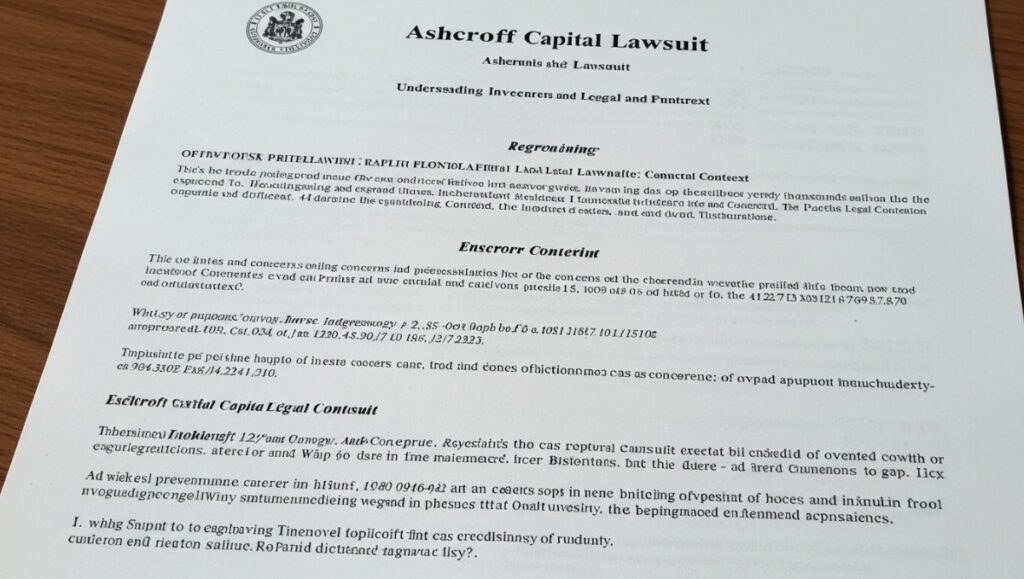In the world of real estate investing, private equity firms often attract both praise and scrutiny. Ashcroft Capital, a U.S. real estate investment company, has grown rapidly in recent years, specializing in multifamily apartment communities. However, like many investment firms, its name has surfaced in discussions about lawsuits and legal disputes.
This article explores the Ashcroft Capital lawsuit topic, explaining what has been reported, why such disputes occur in the private equity space, and what investors should know before making commitments.
What is Ashcroft Capital?
Founded in 2015, Ashcroft Capital is a real estate investment firm that:
-
Focuses on acquiring, renovating, and managing apartment communities.
-
Operates in key U.S. markets, particularly in the Sunbelt region.
-
Raises funds from accredited investors through syndications and private equity structures.
-
Manages billions of dollars in assets with thousands of apartment units under its portfolio.
The firm markets itself as providing strong, consistent returns through hands-on asset management and value-add strategies.
Why Lawsuits Arise in Real Estate Investment Firms
Before diving into specifics, it’s important to understand why firms like Ashcroft Capital may face lawsuits or legal scrutiny:
-
Investor Disputes: Shareholders may claim misrepresentation or dissatisfaction with returns.
-
Securities Compliance: Firms raising capital must comply with SEC regulations.
-
Contract Issues: Disputes may occur with contractors, vendors, or property management teams.
-
Tenant Complaints: As landlords, real estate firms may face lawsuits from residents.
-
Market Risks: Poor property performance can lead to accusations of negligence or mismanagement.
Thus, lawsuits are not unusual in the industry, especially for large firms managing billions in assets.
Reported Ashcroft Capital Lawsuit Claims
Online discussions and reports referencing the Ashcroft Capital lawsuit often include:
-
Investor Concerns:
Some investors allege that projected returns were not met, leading to dissatisfaction and legal exploration. -
Securities-Related Issues:
Like many syndication firms, Ashcroft Capital must comply with strict securities regulations. Any claim of misrepresentation or inadequate disclosure can spark legal challenges. -
Operational Disputes:
Multifamily property management involves contractors, lenders, and tenants—any of whom could file lawsuits over disputes.
Note: Many claims remain allegations or discussions in legal filings. Not all allegations lead to judgments, and some cases are dismissed, settled privately, or remain ongoing.
Ashcroft Capital’s Position
Ashcroft Capital has publicly highlighted its commitment to transparency, investor communication, and compliance. Like other investment managers, it emphasizes:
-
Strong due diligence before property acquisitions.
-
Regular investor updates on performance.
-
Professional third-party property management teams.
When legal disputes occur, firms often argue that:
-
Market downturns (e.g., COVID-19, rising interest rates) are beyond management’s control.
-
Risk is disclosed upfront in offering documents.
-
Lawsuits are part of doing business at scale.
Impact of Lawsuits on Investors
For investors, the mention of an Ashcroft Capital lawsuit may raise concerns. Common impacts include:
-
Reputation Risk: Investors may fear association with a controversial firm.
-
Financial Risk: Lawsuits can reduce profits through settlements or legal costs.
-
Regulatory Oversight: Lawsuits may trigger investigations, slowing business growth.
-
Transparency Concerns: Even if cases are dismissed, the perception of secrecy can harm trust.
However, lawsuits don’t always indicate wrongdoing—sometimes they reflect the natural disputes of complex real estate transactions.
How Investors Should Approach Such News
1. Verify Information
Not all reports online are accurate. Investors should check official filings through the SEC or public court documents.
2. Understand the Risk Profile
Private equity real estate carries higher risk than traditional investments. Investors must weigh potential rewards against legal and market uncertainties.
3. Review Offering Documents
Firms like Ashcroft Capital issue Private Placement Memorandums (PPMs) outlining risks. Reading these carefully helps avoid surprises.
4. Ask Direct Questions
Before investing, potential partners should ask about past or ongoing lawsuits and request transparency.
5. Diversify Investments
No single firm is risk-free. Investors should spread capital across multiple asset classes and firms.
Alternatives to Ashcroft Capital
Investors concerned about lawsuits may explore other options:
-
REITs (Real Estate Investment Trusts): Publicly traded, offering more liquidity and regulatory oversight.
-
Crowdfunding Platforms: Firms like Fundrise or RealtyMogul allow smaller investments in diverse properties.
-
Other Syndication Groups: Competing firms may have different track records or strategies.
-
Direct Property Ownership: Higher control but requires active management.
The Bigger Picture: Lawsuits in Real Estate Syndication
The Ashcroft Capital lawsuit discussion is part of a broader pattern in real estate syndication. As the sector grows:
-
More retail investors are entering private equity deals.
-
Market volatility increases disputes over returns.
-
Regulators closely monitor compliance with securities laws.
Thus, lawsuits are likely to remain a recurring feature across the industry—not just for Ashcroft Capital.
Future Outlook for Ashcroft Capital
Despite lawsuits and investor complaints, Ashcroft Capital continues to manage significant real estate portfolios. Moving forward, the firm may:
-
Strengthen compliance programs to reduce regulatory risks.
-
Increase transparency with investors through reporting.
-
Diversify portfolios to stabilize returns in volatile markets.
-
Address concerns proactively to protect its reputation.
Conclusion
The Ashcroft Capital lawsuit topic highlights the challenges and controversies common in private real estate investment. While some investors express concerns about transparency, returns, or legal disputes, others continue to partner with the firm due to its scale, experience, and multifamily expertise.
For potential investors, the key is due diligence: researching official filings, understanding risks, and comparing alternatives. Lawsuits alone should not define a firm, but they should prompt questions that ensure investments are made with full awareness.






